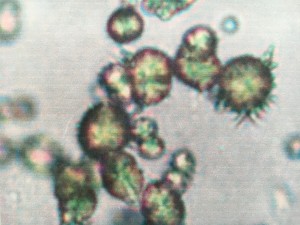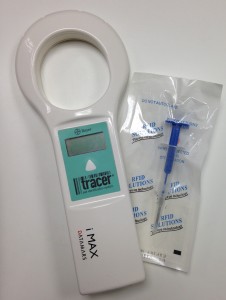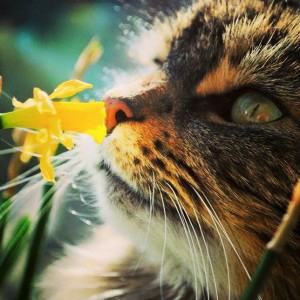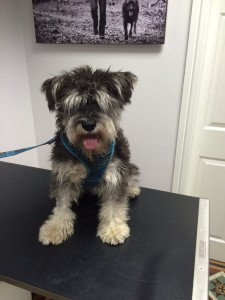 Meet Ernest! He is a wriggly miniature Schnauzer who spent quite a lot of time at Hollybank recently.
Meet Ernest! He is a wriggly miniature Schnauzer who spent quite a lot of time at Hollybank recently.
Ernest was noted by his owner to be straining to urinate over the Christmas bank holiday. A check-up and ultrasound scan showed there was no obstruction to his urinary tract and thankfully, Ernest recovered with a short course of treatment for inflammation of his bladder (cystitis).
Although cystitis is quite a common problem in female dogs, in male dogs there is often an underlying problem triggering the signs. To investigate further, a sample of Ernest’s urine was examined for abnormalities. Sure enough, there were lots of odd looking, spikey crystals seen under the microscope. Often the type of crystals we find can help us determine why they have formed in the first place. Ernest’s crystals were of a type called ammonium biurate which are sometimes found in Schnauzers without causing a problem. However, since Ernest had presented with urinary tract signs, we were keen to do a bit more detective work to work out why they had formed and what ought to be done about them.
The formation of ammonium biurate cystals can be a symptom of abnormal liver function. This is because one of the liver’s jobs is to convert ammonia (a product of food metabolism) to urea. Normally, this urea is transported in the blood to the kidneys which excrete it into the urine. If the liver is not functioning normally, its ability to convert the ammonia is impaired. Ammonia can then build up in the blood to dangerous levels. In excessive quantities, it can form urinary crystals or even stones in the urinary tract.
Ernest’s blood test results confirmed the suspicion that his liver function was reduced. A good indicator of liver function is a bile acid measurement and Ernest’s reading was very high indeed; the pathologist at the external lab said it his was the highest she had ever recorded! Such a high level made us very suspicious Ernest could have an abnormal blood supply to his liver, this is called a portosystemic shunt. In patients with this condition, rather than blood being taken to and from the liver in the normal way, an abnormal blood vessel exists that diverts blood away from the liver. Since the liver is being bypassed, it cannot work on all the products of metabolism as it should. It also fails to develop to a normal size since it needs a good blood supply to its own tissue to do this. The overall result is that all the substances the liver ought to detoxify can build up to life threatening levels and cause a serious problem for the patient.
An ultrasound scan performed by Jerry Shimali, a visiting specialist, was arranged for Ernest and the presence of the portosystemic shunt was confirmed. The next step was to discuss treatment options with Ernest’s very worried mum. It can be tricky to decide on the best way forward in these cases. The only definitive treatment for any portosystemic shunt is surgery to occlude it and correct the blood supply to the liver. The trouble was that Ernest’s liver had been receiving a reduced blood supply his whole life and would not necessarily cope well with a sudden increase. Complications can range from abdominal pain to seizures and death. By this point, Ernest had recovered from his urinary signs. It is a big decision for any owner to weigh up the risks of surgery against a beloved pet that seems outwardly healthy. Ernest’s mum made the brave decision to go ahead with surgery on our advice that this would give him the best chance of leading a full and healthy life with the fewest long term complications.
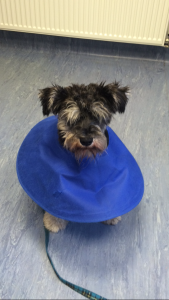 Ernest took a month’s course of medications prior to his surgery to reduce his risk of post-operative complications. Finally, the day of his operation arrived; the tricky and delicate surgery was carried out by Catherine Sturgeon a visiting soft tissue surgeon with whom we work closely on a regular basis. Catherine took the utmost care to occlude the shunt at the optimum place in Ernest’s abdomen.
Ernest took a month’s course of medications prior to his surgery to reduce his risk of post-operative complications. Finally, the day of his operation arrived; the tricky and delicate surgery was carried out by Catherine Sturgeon a visiting soft tissue surgeon with whom we work closely on a regular basis. Catherine took the utmost care to occlude the shunt at the optimum place in Ernest’s abdomen.
Thankfully, Ernest’s recovery from anaesthesia was uneventful. He was hospitalised at Hollybank for five days and was monitored very closely by our nurses during this time. A supply of emergency drugs was kept by his bedside in case they would be needed at any stage. The nurses worked hard at tempting Ernest to eat as soon as possible after surgery to keep his blood sugar levels up. Their meticulous care paid off and the little monkey was discharged, apparently unaware he had had a surgery at all! Over time, Ernest’s liver should become accustomed to its increased blood supply and take on more and more of a normal level of function.
Ernest returned to his owner as the same wriggly bundle of fun he has always been. We are delighted to report his wounds have healed and he is doing well without the medications. We look forward to hearing all about his future adventures with his sister Nora!

